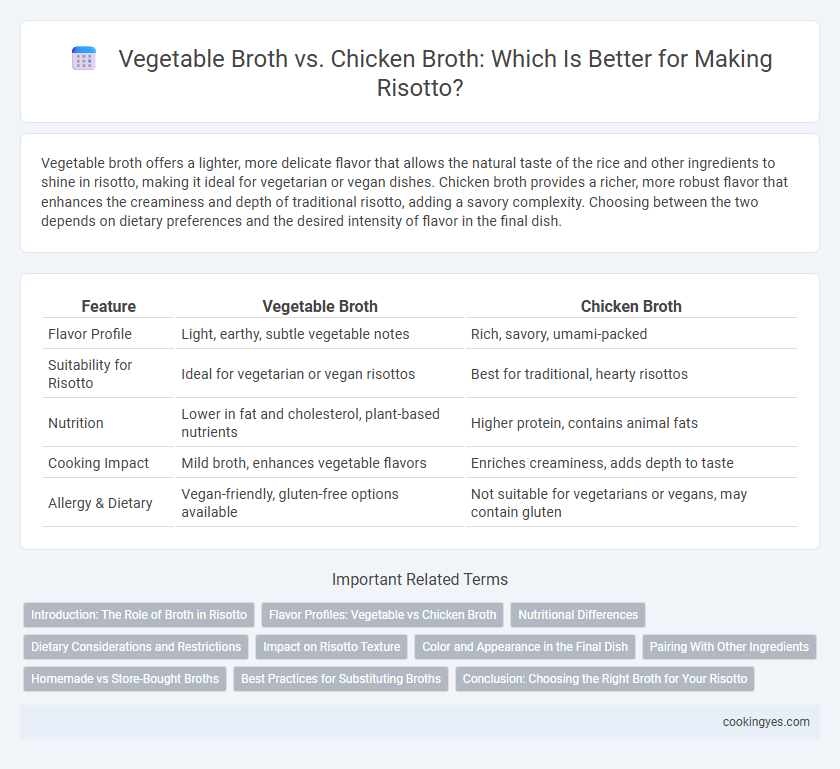Vegetable broth offers a lighter, more delicate flavor that allows the natural taste of the rice and other ingredients to shine in risotto, making it ideal for vegetarian or vegan dishes. Chicken broth provides a richer, more robust flavor that enhances the creaminess and depth of traditional risotto, adding a savory complexity. Choosing between the two depends on dietary preferences and the desired intensity of flavor in the final dish.
Table of Comparison
| Feature | Vegetable Broth | Chicken Broth |
|---|---|---|
| Flavor Profile | Light, earthy, subtle vegetable notes | Rich, savory, umami-packed |
| Suitability for Risotto | Ideal for vegetarian or vegan risottos | Best for traditional, hearty risottos |
| Nutrition | Lower in fat and cholesterol, plant-based nutrients | Higher protein, contains animal fats |
| Cooking Impact | Mild broth, enhances vegetable flavors | Enriches creaminess, adds depth to taste |
| Allergy & Dietary | Vegan-friendly, gluten-free options available | Not suitable for vegetarians or vegans, may contain gluten |
Introduction: The Role of Broth in Risotto
Broth deeply influences risotto's flavor and texture, with vegetable broth offering a lighter, plant-based base that enhances subtle vegetable notes. Chicken broth imparts a richer, savory depth, adding complexity and a slightly creamy texture to the risotto. Choosing the right broth balances the dish's taste profile and complements the chosen ingredients effectively.
Flavor Profiles: Vegetable vs Chicken Broth
Vegetable broth offers a lighter, earthier flavor profile with subtle notes of herbs and vegetables that allow the natural taste of risotto ingredients to shine, making it ideal for vegetarian or vegan dishes. Chicken broth provides a richer, more robust umami depth with savory undertones that enhance the creaminess and complexity of the risotto. Choosing vegetable broth results in a fresher, cleaner taste, while chicken broth imparts a hearty, comforting flavor that complements traditional risotto recipes.
Nutritional Differences
Vegetable broth contains fewer calories and less fat compared to chicken broth, making it a lighter choice for risotto while providing beneficial antioxidants and vitamins from vegetables like carrots, celery, and onions. Chicken broth offers higher protein content and additional minerals such as iron and zinc, enhancing the risotto's nutrient profile but with slightly increased sodium levels. Choosing between vegetable and chicken broth impacts the risotto's nutritional balance, influencing calorie intake, protein availability, and micronutrient diversity.
Dietary Considerations and Restrictions
Vegetable broth offers a plant-based, allergen-friendly option for risotto, making it ideal for vegetarians, vegans, and those with poultry allergies or dietary restrictions. Chicken broth provides a richer, more savory flavor profile but is unsuitable for individuals avoiding animal products or following kosher, halal, or vegan diets. Choosing vegetable broth enhances risotto's nutritional value by reducing cholesterol and saturated fat, aligning with heart-healthy and low-calorie meal plans.
Impact on Risotto Texture
Vegetable broth imparts a lighter, subtler flavor to risotto, allowing the rice's natural creaminess to stand out while maintaining a delicate texture. Chicken broth adds richness and depth, contributing to a creamier, more robust mouthfeel due to its higher fat and protein content. Selecting between the two broths influences the final risotto texture, with vegetable broth producing a cleaner, tender grain and chicken broth delivering a thicker, more velvety consistency.
Color and Appearance in the Final Dish
Vegetable broth imparts a lighter, often translucent color to risotto, enhancing the dish's natural tones and maintaining a clean, vibrant appearance. Chicken broth tends to create a richer, deeper golden hue, adding warmth but potentially masking the brightness of fresh ingredients. The choice between them influences not only flavor but also the visual appeal, with vegetable broth offering a more delicate and colorful presentation.
Pairing With Other Ingredients
Vegetable broth offers a light, earthy base that enhances the natural flavors of vegetables like mushrooms, asparagus, or peas in risotto, making it ideal for vegetarian or vegan dishes. Chicken broth provides a richer, savory depth that pairs well with proteins such as chicken, shrimp, or sausage, adding complexity and warmth. Choosing the broth should align with the main ingredients to balance the dish's flavor profile and texture.
Homemade vs Store-Bought Broths
Homemade vegetable broth for risotto offers a fresher, more vibrant flavor profile with controlled salt levels and customizable ingredients, enhancing the dish's natural vegetable notes. In contrast, homemade chicken broth provides a richer, meatier depth that complements creamy risottos but requires longer simmering and careful skimming to avoid cloudiness. Store-bought broths often contain preservatives and higher sodium, which can overwhelm the delicate balance of risotto flavors, making homemade preparations superior for nuanced taste and texture.
Best Practices for Substituting Broths
Using vegetable broth as a substitute for chicken broth in risotto enhances the dish's flavor for vegetarian or lighter options while maintaining a rich, savory base essential for proper risotto texture. When substituting, choose a low-sodium, homemade or high-quality vegetable broth to control salt levels and deepen taste complexity, ensuring the broth complements rather than overpowers the rice and other ingredients. Gradually add the broth, maintaining a consistent simmer and stirring frequently to promote starch release and creamy consistency, key for authentic risotto preparation regardless of broth choice.
Conclusion: Choosing the Right Broth for Your Risotto
Selecting the right broth for risotto hinges on the desired flavor profile and dietary preferences, with vegetable broth offering a lighter, vegetarian-friendly option and chicken broth delivering a richer, more savory taste. Vegetable broth enhances fresh, herbal notes ideal for spring or summer risottos, while chicken broth complements hearty, autumnal recipes with deeper umami flavors. For optimal results, using homemade broths rich in nutrients and free from additives elevates the risotto's texture and overall taste profile.
Vegetable Broth vs Chicken Broth for Risotto Infographic

 cookingyes.com
cookingyes.com